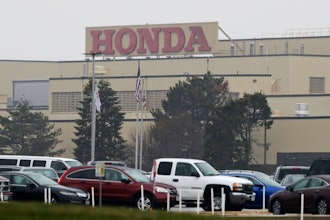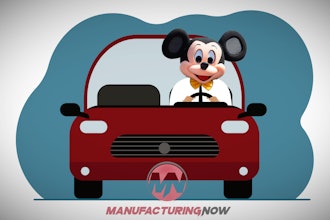The Council on Competitiveness’s Make: An American Manufacturing report issues a call to the American people to keep manufacturing a cornerstone of American independence, economic prosperity, and national security. This series was recently presented to the government as a non-partisan strategy to resolve issues facing American manufacturing. Manufacturing.net sister publication Industrial Maintenance & Plant Operationsat down with Jack McDougle, Senior VP, Council on Competitiveness to discuss the report’s strategy and to see where the Council sees U.S. manufacturing headed for in the future.
IMPO: In the Make: An American Manufacturing Movement report, the council says that it is “deeply concerned” that the United States has yet to understand the challenges affecting the American economy. What do you think needs to happen for Americans to understand the current challenges, and do you see a widespread understanding of America’s economic problems happening any time soon?
McDougle: I think that in order for more folks to understand what we’re doing, we have to continue the conversation. The council is very pleased to see manufacturing take such a prominent position in the political dialogue that’s taking place. The downside to that though is the issue becomes politicized, so sometimes it’s hard to peel away what’s actually going on, versus what’s being portrayed sometimes. So we need to continue to push that conversation so that more and more people engage, more and more people gain awareness and a better understanding of what some of the issue are. For example, I think a lot of Americans still view manufacturing as assembly workers going into a plant and assembling products over the course of the day. They don’t necessarily think about advanced manufacturing facilities. It’s going to take some time to increase the awareness of what manufacturing is, and will be in the future.
Since releasing the report, we’ve seen an increase in attention being paid to these issues. Now I think the question over the next several years will be ‘what steps as a country are we going to take to encourage manufacturing, and grow manufacturing?’
IMPO: Greater global competition has increased American manufacturing workers’ productivity. How can America balance rising productivity with its inverse effect on employment?
McDougle: There are really good economic reasons why we lost a lot of our manufacturing jobs. A lot of them were very low value-added, very routine—most of that has gone to robots and automation. So we’ve lost a significant number of jobs due to that. And we’ve lost some jobs to companies locating globally—but the council recognizes that it’s important for U.S. companies to have a global presence, very much like foreign companies have a presence here. Kia Motors, Toyota, Siemens, Volkswagen—there are a number of foreign companies investing in the U.S. Of the roughly 11 million U.S. manufacturing jobs, 2 million are working for foreign owned manufacturing companies here in the U.S., so it’s really important.
U.S. manufacturing firms need to have a presence overseas—it makes sense. So there’s a relationship between global operations as well as what happens in the United States. But one of the things that’s really important too, is that the United States has a very strong manufacturer supplier base—the small and medium enterprises that feed up to a lot of the global companies. So having a better understanding of how those supplier networks operate is very important because there is job creation in the smaller companies. Also, a lot of the job creation is going to come because manufacturing becomes more sophisticated, and it requires more engineers, more designers, more maintenance workers. The challenge is though, that we really need to keep up on the educational and technical training side.
Not everybody needs a PhD in engineering, but a lot of folks are going to need 2, 3, 4-year certification programs in advanced manufacturing technologies. It’s restoring the idea that a technical education can get people to a really good lifestyle and income. For 30 years, we’ve been telling people in order to have upward mobility, you need to go on and get a 4-year college education—and that’s not the only way to do it. I think rebalancing that is going to be really important, but there’s not going to be a quick fix to that. One of our partners estimates that at least 600,000 jobs are open right now in manufacturing firms in the U.S. because they can’t find the skilled workers to fill those jobs. In an era when we’re suffering from high unemployment and people looking, there’s a real mismatch.
Going forward, I don’t think that we’ll see manufacturing employment the way we did in the 1970s, because workers will continue to be more and more productive. But I also think that as we get more sophisticated and more advanced, that the multiplier effect of manufacturing will increase, and so it will support more jobs in other sectors, it will create more wealth. And that’s why, from our perspective, it’s really critical to invest in and encourage manufacturing—because of the multiplier effect. If all of our manufacturing goes somewhere else, then ultimately our ability to sustain a services economy will be depleted as well. It can’t be one or the other.
IMPO: The Make: An American Manufacturing Movement report says that many U.S. localities do to little to attract manufacturing facilities—what should local agencies be doing?
McDougle: I think one of the challenges is that there are so many different agencies involved—local, state, federal. There definitely could be better coordination between them—streamlining permitting processes—once you get your building permit from the local authorities, but then you still have to go and get state, environmental certifications, EPA certifications. By the time you get through that process, you’re market window could be squeezed dramatically. Much better coordination between agencies would be an effective way to speed up those processes. It’s one of the things that we’ve heard throughout our initiative on manufacturing—the permitting process and the speed and ability to get a plant up and running was a huge factor.
China has an advantage in that area, but they’re an authoritative regime, so they can go in and they can just, irrespective of what the local citizens want or need, say ‘we’re going to put this plant here.’ We don’t advocate that as a solution—we need to balance the needs of communities, the environment—we also need to make sure we’re looking after economic development as a priority, too.
IMPO: Where’s the balance between corporate taxes and regulations, and growth in the manufacturing industry?
McDougle: We do think that U.S. manufacturers are at a significant disadvantage because U.S. tax rates are higher than any other developed economy. The cost to operate for U.S. manufacturers is significant. On global taxes, the U.S. is the only advanced economy that has taxes on global operations of U.S. companies if they want to bring that money back and invest in the United States. If you were to put a territorial tax system in place, U.S. companies earning profits overseas could bring them back and invest in the U.S. with no problem. So Toyota can bring its profits from the U.S. back to Japan without any tax penalties. From our perspective, that would significantly encourage and increase investment in the United States.
The regulatory process has become so cumbersome. We think there are a number of things that can be done to streamline the regulatory process—increase the importance of understanding the economic, both negative and positive impacts, of regulations. For years, regulations have looked to societal benefits—workplace safety, community safety, environmental improvement—but economic growth has not always been considered a benefit to society. So we would suggest that it’s equally important and that we need to balance those needs in a better way to ensure that we can protect both objectives.
IMPO: Where do you think the state of manufacturing in America is headed in the near future?
McDougle: I think we’re on the verge of potential breakthroughs. And I think it’s probably got less to do with macroeconomic issues, and we’ve gone through what ultimately I think will be a transition period from the Henry Ford model of production into something that’s very different. A lot of the innovations that are going to be coming out around energy, materials by design, nanofabrication, a lot of the stuff happening with bio—I think it can revolutionize where we are with manufacturing and allow manufacturing to reinvent itself.
It’s almost like the transition from an agricultural economy to an industrial economy. It’s almost going from an industrial economy to an advanced manufacturing economy. One of our concerns is, for the United States to really capture the benefit of that and to drive economic growth and improvements over the next few generations, we’ve got to make sure we have a really well established manufacturing base, and that we can manufacture at scale in this country. Otherwise as all these innovations come out of the laboratory, competing economies are going to buy them up and make them. We’ve already seen some of that and we’ve got to prevent that from happening. There will be low value-added commodity type manufacturing—some of it will be attracted to the U.S. and we’ll lose some of it—that’s normal business cycles. But we really need to make sure that we can scale manufacture and improve our return on investment as these new innovations keep coming out.
IMPO: How is the council adapting to deal with the broader, more complex challenges of a global economy?
McDougle: We are a membership driven organization and so we’re constantly challenging our members and our members are constantly challenging us and trying to figure out ways on how to move forward. One of the things that the council is doing this year is really increasing its outreach efforts as opposed to just looking at issues and developing reports and sets of recommendations. We’re broadening our scope a bit to help drive a much more national conversation about these issues. For example, right now one of the things that we’re working on doing is manufacturing town hall meetings across the country with governors and business leaders and others. To increase awareness about these issue, to improve people’s understanding about what’s going on—ultimately that will lead to better policies, from our perspective.
We’re also doing a number of things around instituting learning laboratories. We’re working on pilot projects. For example, the council is the lead on putting together the National Digital Engineering and Manufacturing Consortia. What we’re doing there is bringing advanced modeling and simulation capabilities to small and medium enterprises. The pilot is now running in the Midwest and we’re looking to ultimately expand across the country.
So becoming a little bit more proactive in trying to make sure that the right tools and ideas are spreading out there. That’s probably one of the biggest transformations that the council is going through right now—taking a much more active role, pushing things on the ground.
There are a lot of challenges out there, and one of the things that we do say in our report is, depending on who you listen to, manufacturing is in steep decline, it’s doing fine, or it’s growing rapidly. You can find evidence out there to support any of those perspectives. Manufacturing has problems, but it also has a lot of bright spots. We’re convinced that we need a more coordinated approach to manufacturing to be successful, because it is getting more complicated out there.






















